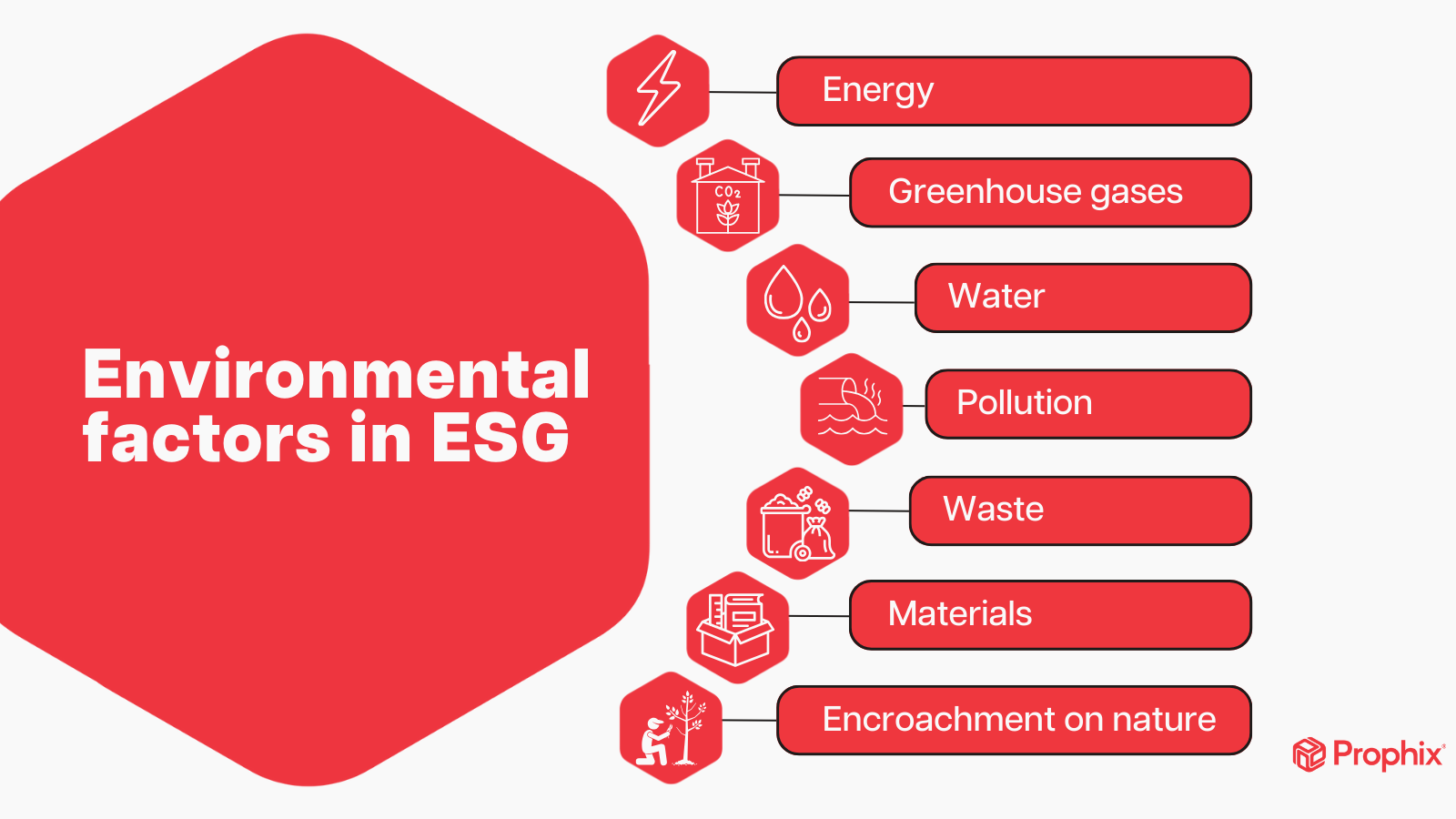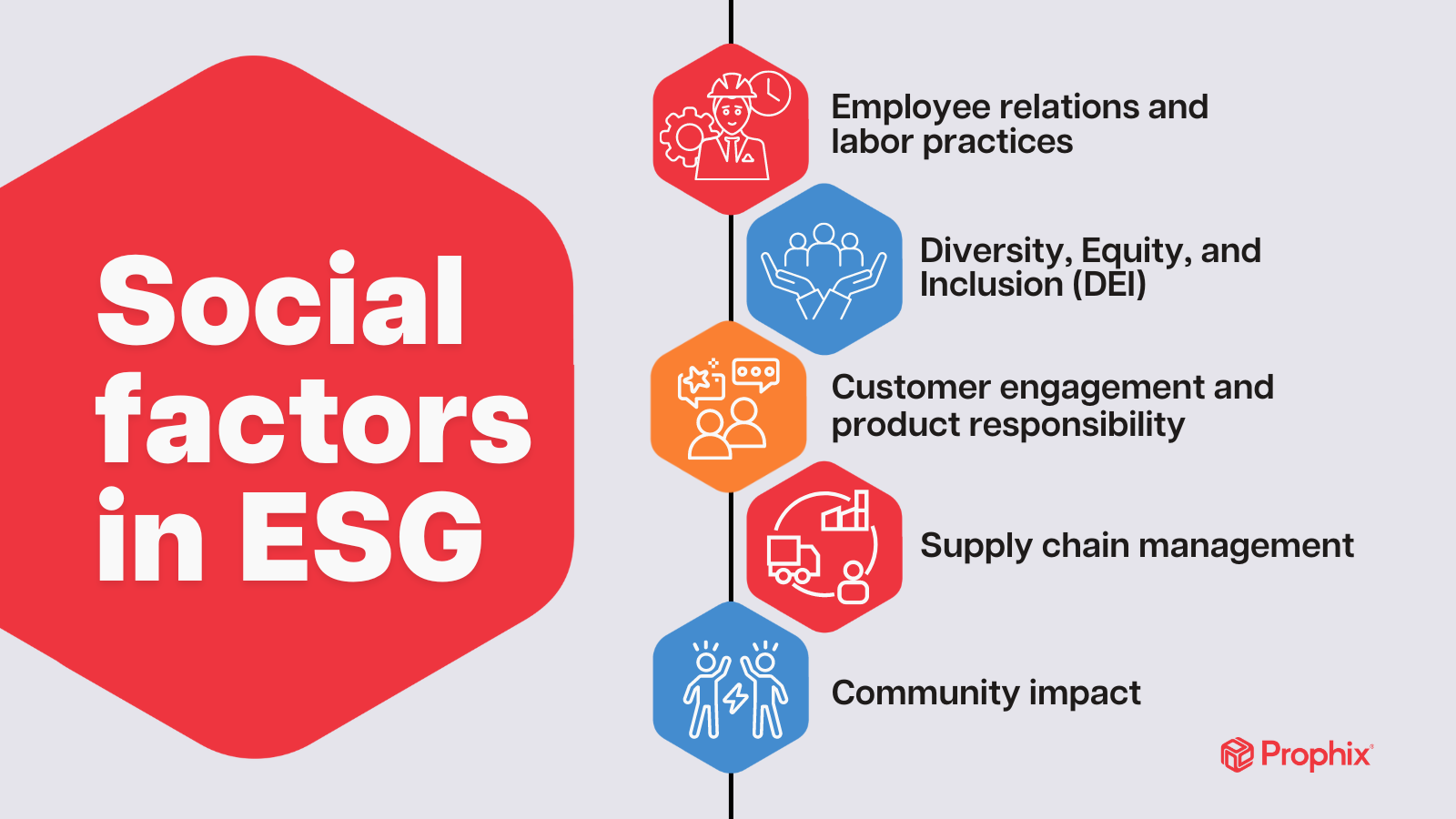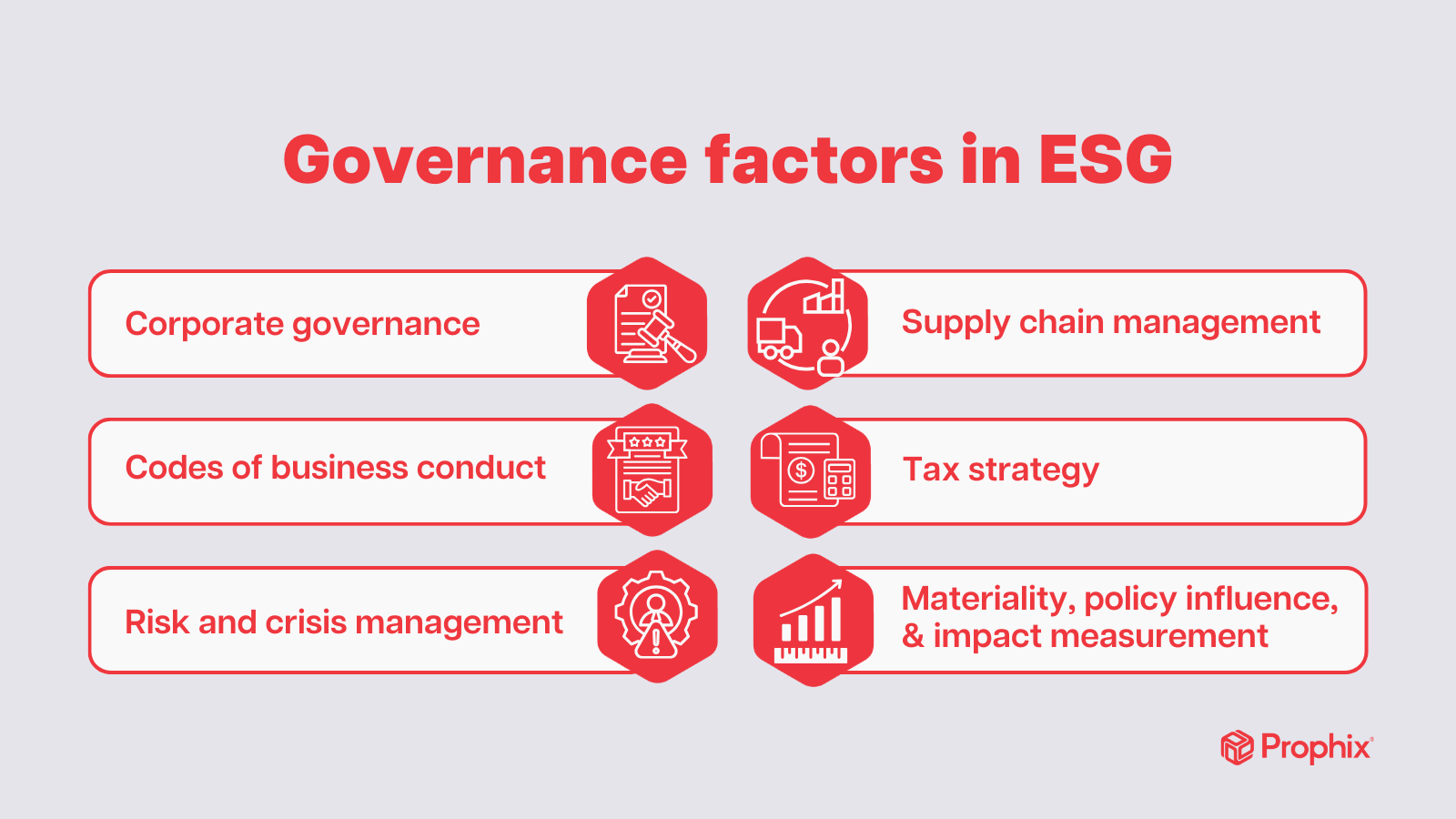A guide to 2024 ESG regulations in Canada & across the globe
In a world where sustainable practices are increasingly crucial, understanding Environmental, Social, and Governance (ESG) regulations is key.
From Canada to the farthest corners of the globe, these regulations are shaping the way businesses operate. In this guide, we'll navigate the evolving landscape of ESG regulations in 2024, providing you with the knowledge to not just comply, but thrive. In this article, we’ll cover:
Wat is ESG?
ESG stands for environmental, social, and governance. ESG data is used to measure a company’s environmental and social impact and is usually as part of a broader regulatory reporting practice, although some companies share this information voluntarily. In other words, ESG is a way to evaluate a company’s performance beyond what’s communicated in their balance sheet and reports.
Milieu
The environmental aspect of ESG often includes data on:
- Energy – This refers to the amount of energy utilized in manufacturing processes, transportation, office operations, and other business activities.
- Greenhouse gases – This reflects the volume of greenhouse gases produced by the company during its operations.
- Water – This measures the quantity of water consumed in the company's manufacturing processes or other operational activities.
- Pollution – This includes the amount and type of pollution generated by the company and how this pollution is managed or mitigated.
- Waste – This tracks the volume of waste produced through the company's operations and how this waste is disposed of or recycled.
- Materials – This looks at how materials are procured, whether they are sourced sustainably, and if they are renewable or recyclable.
- Encroachment on nature – This assesses the company's impact on surrounding environments, ecosystems, and wildlife.
Each of these factors contributes to a company’s environmental footprint and its overall ESG rating.

Sociaal
Much like the environmental aspect of ESG, social is a measure of how well a company treats and retains its employees, but it also extends to relationships with suppliers, customers, and communities where the company operates. Social data includes metrics around:
- Employee relations and labor practices: This covers areas such as employee turnover rate, tenure, fair compensation, labor standards, and workplace health and safety.
- Diversity, Equity, and Inclusion (DEI): This includes initiatives to promote diversity in the workforce, equal opportunities, and inclusive practices.
- Customer engagement and product responsibility: This involves product safety, quality, pricing fairness, and customer privacy.
- Supply chain management: This focuses on the sustainability and ethical practices of a company's suppliers.
- Community impact: This evaluates the company's contributions to the local communities where it operates, which could include philanthropic efforts, infrastructure investments, and community engagement activities.

Bestuur
Governance data is a measure of how a company manages its operations and ensures accountability to its stakeholders. This can include metrics on:
- Corporate governance: This involves the structure and diversity of the board, its effectiveness, experience, executive compensation policies, and the extent of management's ownership in the company.
- Codes of business conduct: This focuses on the company's ethical guidelines, including its stance and procedures regarding corruption and bribery, as well as how it handles breaches of these codes.
- Risk and crisis management: This includes the company's approach to identifying, managing, and mitigating risks, as well as its preparedness for potential crises. It may involve sensitivity analysis, stress testing, and evaluation of the company's risk governance culture.
- Supply chain management: This pertains to the company's oversight of its supply chain, ensuring that suppliers also adhere to good governance and ethical practices.
- Tax strategy: This covers the company's approach to tax planning, reporting, and governance, ensuring it complies with all relevant laws and regulations.
- Materiality, policy influence, & impact measurement: This involves how the company determines the relevance and significance of ESG issues (materiality), its influence on public policy related to ESG factors, and how it measures and reports its impact on these issues.

What does ESG have to do with corporate finance?
ESG factors are becoming increasingly important in corporate finance. While they are not currently apart of Generally Accepted Accounting Principles (GAAP) or International Financial Reporting Standards (IFRS), there are several initiatives and frameworks, like the Sustainability Accounting Standards Board (SASB) and the Global Reporting Initiative (GRI), that provide guidelines for including ESG data in financial reporting.
Not all companies are required to comply with these guidelines, and some choose to disclose their ESG data voluntarily. However, this data is valuable to stakeholders, investors, and other interested parties as it helps them make more informed decisions about the company's operations, particularly in relation to its environmental and social impacts.
In addition, ESG performance can influence a company's financial performance and access to capital. Companies with strong ESG practices may be more attractive to investors and lenders, potentially leading to lower capital costs. Furthermore, good ESG performance can reduce regulatory risks and enhance a company's reputation, which can also have financial benefits.
Wat zijn ESG-voorschriften?
ESG regulations standardize the collection, reporting, and disclosure of environmental, social, and governance data, and serve as a framework to evaluate a company’s environmental and social impact. These regulations may vary by country and industry, and they serve as a framework for companies to evaluate and communicate their overall ESG performance.
ESG data improves transparency and accountability and allows stakeholders, employees, customers, and investors to make informed decisions about a company’s sustainability efforts.
ESG regulations vs. ESG standards
ESG regulations are often legally binding rules set by governments or regulatory bodies that companies must comply with. Examples include mandatory disclosure requirements for publicly traded companies and rules on non-financial reporting.
On the other hand, ESG standards, such as those set by the Global Reporting Initiative (GRI), the Sustainability Accounting Standards Board (SASB), and the Task Force on Climate-related Financial Disclosures (TCFD), provide guidance on how to report ESG data. They are not legally binding but are widely recognized and used by companies worldwide.
However, it's important to note that there is currently no universally accepted standard for ESG reporting. Different organizations may use different standards, leading to variations in how ESG data is reported and disclosed. This can make it challenging to compare ESG performance across different companies. Efforts are ongoing to develop more harmonized and consistent global standards for ESG reporting.
The ESG regulations you need to know in 2024
As discussed above, there are several regulations that can inform your approach to ESG, including:
Sustainability Disclosure Requirements (SDR)
Sustainability Disclosure Requirements (SDR) aim to ensure that companies are transparent about their ESG practices. This includes everything from how they manage their carbon footprint to their labor practices and board diversity.
Fast facts
- Created by: The UK Financial Conduct Authority (FCA)
- Created on: Finalized in late 2023
- Region: SDR regulations apply only to UK companies and companies that sell products marketed in the UK
- Purpose: To improve access to sustainability information for consumers and address the issue of greenwashing as a barrier to sustainable investment
- Kom meer te weten: Visit the UK Financial Conduct Authority for detailed guidelines
The Sustainable Finance Disclosure Regulation (SFDR)
The Sustainable Finance Disclosure Regulation (SFDR) was designed to increase transparency about sustainability impacts of investments, prevent greenwashing, and direct more capital towards sustainable growth.
Fast facts
- Created by: European Parliament
- Created on: SFDR came into effect in March 2021, and become mandatory in January 2023
- Region: Companies based in or trading in the European Union with more than 500 employees, including investment businesses, retirement funds, asset managers, insurance firms, banks, venture capital funds, and credit institutions that manage portfolios.
- Purpose: To make it easier for investors to compare how 'green' different funds are. It also helps guide money towards companies that focus on sustainability.
- Kom meer te weten: For more details, visit the SFDR website
EU Taxonomy for Sustainable Activites
The EU taxonomy for sustainable activites regulations are a set of rules that classify which economic activities are 'green' or 'sustainable', aiming to help investors avoid greenwashing and promote environmentally friendly investments, with companies now required to publicly disclose how well they meet these criteria.
Fast facts
- Created by: European Parliament
- Created on: Established in 2022, it became mandatory to report on EU Taxonomy alignment on January 1, 2023.
- Region: Companies based in or trading in the European Union
- Purpose: Helping to steer investments into the areas that are the most important for making a sustainable change
- Kom meer te weten: To get an in-depth look at the EU Taxonomy, visit the European Union’s website.
The Corporate Sustainability Reporting Directive (CSRD)
The Corporate Sustainability Reporting Directive (CSRD) is a regulation that requires a larger number of EU-listed entities, including businesses and financial institutions, to report more extensively on sustainability topics such as environmental impacts, social responsibility, human rights, anti-corruption measures, and board diversity, enhancing transparency and aiding in the assessment of climate change and other sustainability risks.
Fast facts
- Created by: European Parliament
- Created on: CSRD was enacted in January 2023 and will become compulsory for all large public-interest entities with over 500 employees in 2024. However, it's crucial to note that the rollout of CSRD is gradual and extends beyond large entities. Companies that meet at least two of the following three conditions: €40 million in net turnover, €20 million in assets, or 250 or more employees, will also have to comply with CSRD. This expansion is expected to bring over 50,000 entities under the CSRD reporting umbrella.
- Region: While the initial wave primarily targets large public-interest companies with more than 500 employees, including listed companies, banks, insurance companies, and other companies designated by national authorities as public-interest entities, the directive will progressively encompass smaller entities as well.
- Purpose: To allow investors, consumers, policymakers, and other stakeholders to evaluate companies’ non-financial performance.
- Kom meer te weten: To deep dive into CSRD, visit the European Union’s website.
The Corporate Sustainability Due Diligence Directive (CSDDD)
The CSDDD is an EU initiative that mandates large companies actively manage and reduce the risk of human rights and environmental violations in their operations and supply chains, and it includes measures like risk management, impact analyses, grievance procedures, monitoring, public communication, and creating climate transition plans.
Fast facts
- Created by: European Parliament
- Created on: Introduced in 2022 and passed Parliamentary vote in 2023.
- Region: Large companies based in the EU, as well as companies that have significant operations within the EU.
- Purpose: Hold companies accountable for any negative impacts they cause, this includes their own operations and those within their supply chains, both within and outside of Europe.
- Learn more: To see how CSDDD impacts you, visit the European Union’s website.
Streamlined Energy and Carbon Reporting (SECR)
The UK's Streamlined Energy and Carbon Reporting (SECR) policy requires a wide range of large companies to report their energy consumption and carbon emissions annually to encourage energy efficiency.
Fast facts
- Created by: UK government
- Created on: SECR came into effect in April 2019
- Region: Companies in the UK that are listed on the London Stock Exchange or that have more than 250 employees, annual revenue of over £36 million, or an annual balance sheet of more than £18 million.
- Purpose: Encourage businesses to implement energy efficiency measures
- Kom meer te weten: To get the details on SECR, visit the UK government’s website
The German Supply Chain Due Diligence Act (the LkSG)
Germany's Supply Chain Due Diligence Act (LsKG) requires large companies to ensure social and environmental standards are met throughout their supply chains, expanding its coverage in 2024, with penalties for non-compliance including fines and sanctions.
Fast facts
- Created by: German Parliament
- Created on: The LkSG went into effect on January 1, 2023
- Region: German and non-German companies with more than 3,000 employees. In 2024, these regulations will apply to companies with more than 1,000 employees.
- Purpose: Ensures that German businesses address the environmental and social impacts of their actions
- Learn more: For more information on the LkSG, visit the German Parliament’s website
What is ESG compliance?
ESG compliance is a company’s commitment to adhere to ESG regulations and reporting requirements as it relates to environmental, social, and governance data.
ESG compliance is important for publicly traded companies, as it allows investors to make informed decisions about a company's operations, societal impact, and how it handles its responsibilities.
Environmental, social, and governance compliance
Environmental, social, and governance compliance reflects a company’s dedication to reducing their impact on the environment, improving, and maintaining their relationships with stakeholders, and how it manages its operations. Complying with ESG regulations often involves adhering to strict guidelines around collecting, capturing, and distributing ESG data, which is often dictated by the country where the company operates.
ESG compliance vs. ESG regulations
To maintain ESG compliance, companies must abide by their operating country’s regulations, as it relates to reporting. Compliance with ESG regulations is dictated by the specific laws and guidelines set forth by regulatory bodies in the company's operating country, which may include disclosures about environmental impact, social responsibility efforts, and governance structures.
Software to help comply with ESG regulations
ESG software is an essential tool that helps companies streamline the collection, validation, and compilation of Environmental, Social, and Governance (ESG) data. ESG software can help you comply with ESG regulations by:
- Simplifying the management of sustainability data
- Eliminating the manual efforts involved in gathering and organizing data
- Creating a single source of data truth, enhancing communication and decision-making
- Automating data validation for accuracy, data analysis for performance evaluation, and risk management
- Standardizing ESG reports for internal use, external communication, and regulatory compliance
- Integrating with other business systems to optimize data collection and sustainability management
ESG regulations across the globe
Now that you’re familiar with what ESG is, different types of ESG regulations, and how ESG frameworks and compliance differ, let’s dive into ESG regulations across the globe.
ESG regulations in Canada
ESG reporting in Canada is not yet mandatory for all companies but is increasingly in demand by investors and stakeholders. However, federally regulated financial institutions such as banks and insurance companies are required to report on ESG factors. Canadian ESG regulations include:
- Corporate Diversity Reporting
- S-211 Supply Chain Reporting
- Canadian Securities (CSA) Corporate ESG Reporting and Disclosure
- CSA ESG Investment Fund Disclosure
- Supplier ESG Disclosure for Large Federal Contractors
- Canada’s Climate Investment Taxonomy
ESG regulations in the United States
Depending on a company’s industry, size, and jurisdiction, they may have to comply with several ESG regulations in the United States, including:
- Sustainability Accounting Standards Board (SASB) Standards
- Securities and Exchange Commission (SEC) Disclosure Regulations
- Nasdaq Board Diversity Requirements
- Global Reporting Initiative (GRI) Standards - voluntary
ESG regulations in the EU
The European Union is at the forefront of ESG regulations, and many companies must comply with:
- Sustainable Finance Disclosure Regulations
- EU Taxonomy
- The Corporate Sustainability Reporting Directive (CSRD)
- Supply Chain Due Diligence Directive (CSDDD)
- EU Green Bond Standard
ESG regulations in the UK
Some UK-registered companies and financial institutions must adhere to the following ESG regulations:
- UK Sustainability Disclosure Standards (SDS)
- IFRS Sustainability Disclosure Standards
- The Companies Regulations 2022
- The Limited Liability Partnerships Regulations 2022
ESG regulations in Asia
In contrast to other developed nations, the Asia-Pacific Region does not have consistent ESG regulations or frameworks. The Association of Southeast Asian Nations (ASEAN) released a taxonomy for sustainable finance in late 2021, but this ESG framework is still under discussion.
However, in July 2023, The Securities and Exchange Board of India (SEBI), released new regulations for ESG investment funds. In Singapore, banks are also now required to manage climate-related risks and conduct scenario analysis. In addition, Mainland China has introduced new disclosure standards and there's an increased focus on stewardship across Southeast Asia. Hong Kong has also revised its Corporate Governance Code and Listing Rules to enhance corporate governance disclosures.
ESG standards and frameworks
ESG standards and frameworks serve as guiding principles for companies to integrate environmental, social, and governance (ESG) factors into their operations. They provide a structure for businesses to manage and report on their ESG performance, helping to ensure transparency and accountability.
ESG standards
ESG standards are specific requirements or guidelines that companies follow to measure and disclose their ESG performance. These standards often include criteria for assessing a company's impact on the environment, its relationships with employees and communities, and its governance practices. By adhering to ESG standards, companies can demonstrate their commitment to sustainability and responsible business practices.
ESG frameworks
ESG frameworks are overarching systems that provide a comprehensive approach to managing and reporting on ESG issues. They typically include a set of principles, metrics, and tools that guide companies in incorporating ESG considerations into their strategic planning and decision-making processes. ESG frameworks help businesses to understand, manage, and communicate their ESG risks and opportunities effectively.
Conclusion: Stay ahead of changing ESG regulations
As you navigate the ever-evolving landscape of ESG regulations, staying informed is your best strategy. From Canada to the rest of the globe, these guidelines shape the future of sustainable business.
We hope this guide has equipped you with the knowledge needed to not just comply but excel in this new era. Remember, understanding and adapting to ESG regulations isn't just about ticking boxes—it's about thriving in a sustainable future we're all part of.
Want to learn more about ESG regulations? Check out our webinar on How to get ahead of regulatory reporting and audit changes in 2024 or learn more about ESG reporting with Prophix.
